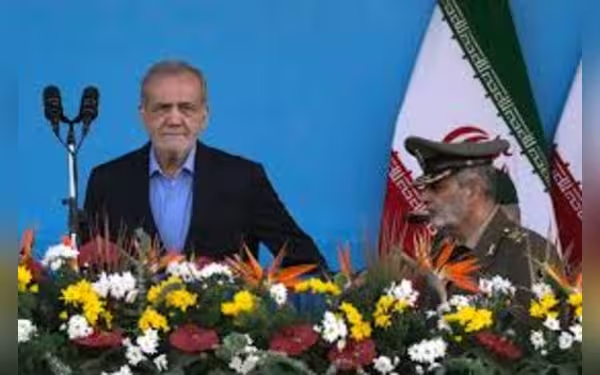Saturday, November 16, 2024 05:38 PM
Iran President Accuses Israel of Escalating Middle East Conflicts
- Iran claims Israel seeks wider conflict in the region.
- Pezeshkian highlights humanitarian crisis in Gaza.
- Tensions rise amid ongoing military actions.
 Image Credits: thefrontierpost
Image Credits: thefrontierpostIran's President Pezeshkian accuses Israel of escalating conflicts, highlighting the humanitarian crisis in Gaza amid rising tensions.
In recent developments, Iranian President Masoud Pezeshkian has made serious allegations against Israel, claiming that the nation is actively seeking to escalate conflicts in the Middle East. This statement comes at a time when tensions in the region are already high, particularly following Israel's military actions in Lebanon and its ongoing conflict with Hamas.
Pezeshkian, who took office in July as a reformist leader, expressed his concerns during a roundtable discussion with journalists while attending the UN General Assembly in New York. He emphasized that Iran has been exercising restraint, hoping to foster peace in the region. He stated, "We know more than anyone else that if a larger war were to erupt in the Middle East, it will not benefit anyone throughout the world. It is Israel that seeks to create this wider conflict."
The backdrop of these comments includes a series of violent incidents, including the assassination of a Hamas political chief in Tehran, which many believe was orchestrated by Israel. This event has only intensified the already strained relations between Iran and Israel. Pezeshkian pointed out that despite appeals from Western nations for Iran to refrain from retaliation, the situation continues to deteriorate. He remarked, "Every day Israel is committing more atrocities and killing more and more people – old, young, men, women, children, hospitals, other facilities."
Moreover, the Iranian president highlighted the ongoing humanitarian crisis in Gaza, where Israeli military actions have reportedly resulted in the deaths of over 41,000 people, most of whom are civilians. He noted that the United Nations has deemed these figures reliable, underscoring the severity of the situation.
While Pezeshkian did not directly answer whether Iran would retaliate against Israel, he raised questions about the narrative that portrays Iran as the instigator of insecurity in the region. He stated, "Curiously enough, we keep being labeled as the perpetrator of insecurity. But look at the situation for where it is." This statement reflects a broader sentiment in Iran regarding its role in the ongoing conflicts.
As the situation unfolds, it is clear that the Middle East remains a complex and volatile region. The accusations made by Pezeshkian highlight the deep-seated tensions between Iran and Israel, which are exacerbated by ongoing military actions and humanitarian crises. Understanding these dynamics is crucial for anyone interested in the geopolitical landscape of the region. The hope for peace seems distant, but the dialogue continues, and the world watches closely.













